An interesting topic came up on a webcomic group the other day, which was all about fictional character names and how creators decide on them. The person who started the topic admitted that it was something that didn’t come easily to them, to the point where it could derail their writing while they sat and stewed for a half hour or more, without success, while the new person they’d just introduced remained frustratingly undesignated. How did the rest of us do it?
Well, I don’t know about the rest of us, but coming up with character names is rarely something I’ve had trouble with, at least where
Zombie Ranch is concerned. I feel like it’s paradoxically harder and more complicated the further away you get from our own world, even if you’re just cramming random syllables together like
Star Wars does. Fantasy genres will often steal actual names from semi-obscure, exotic-sounding languages, like various permutations of Gaelic, and you can probably blame Tolkien for starting that trend. Lovecraft sometimes pulled names for his Elder Gods from legends but otherwise just tended to go for stuff that sounded nasty, guttural, and primal (the proper pronunciation of “Cthulhu” is said to be unachievable by a human throat).
And that’s actually one of my main criteria — I tend to go for names that I feel have a touch of onomatopoeia to them, that give you an image of what the character is like before you even hear anything else about them. Darth Vader, for example, does not sound like someone you’d want looking after your kids. Likewise with Voldemort. Galadriel does not immediately bring to mind a stuffy accountant the way Irwin does. When these sorts of associations are subverted it’s usually for comic effect: “Irwin, slayer of men, master of the four horizons!”, or “Lucretia Darkmoon, V.P. of Finance”. Terry Pratchett was very fond of such discontinuities, when he wasn’t steadfastly playing it straight with descriptive names like “Mustrum Ridcully” and “Moist Von Lipwig”.
As an interesting bit of trivia, in my first script outline Susannah Zane was originally known by the arguably more pedestrian “Jodi Mills”. Dawn wrinkled her nose at that and wanted it changed, so I went back to the drawing board (well, writing board) to come up with something else. I am glad now I did for several reasons, not the least of which was the debut a year or two later of the tough, no-nonsense Sheriff Jody Mills as a semi-regular recurring character on the TV show
Supernatural. But beyond that, Susannah Zane just had a certain flair to it more befitting a heroine of the Old West, or Weird New West as the case might be. Susannah was a name that for me evoked folk songs and prairies, and Zane, well —
that had a deep connection to the genre all its own.
Plus the name just rolled off the tongue, even when shortened to the more practical “Suzie Zane”. I’m a great believer in having character names that roll off the tongue, that have a nice meter to them. One of my pet peeves with
The Walking Dead was Kirkman’s decision to name his lead character “Rick Grimes”, which is a little torturous to grate out in full. Sure, such traffic accidents of names are the norm in real life, but I find them jarring in fiction. Maybe you disagree. Point is, it’s another bit I use to come up with names that I find satisfying, relatively quickly — “Indiana Jones” scans better and sounds far cooler than “Indiana Oliver”. And “Wild Will” Nguyen has his name because the pronunciation of Nguyen sounds a lot like “win” to English-speaking ears, thus serving both alliteration and ego.
Finally I mentioned before how Susannah Zane’s name contains references both subtle and not so subtle that I feel evocative of her character and the Western genre. That’s not limited to her, I’ll often peruse histories of the Old West looking for interesting names that might fit the bill for a character, which is easier than it sounds these days with the magic of Google. “McCarty” was the family name of Billy the Kid. The “Hays” in Frank Hays comes from a known Texas Ranger of the period. The Safe Zone media personality “Iphigenia Langhorne” is a combination of a
Brisco County Jr. reference and the pre-marriage name of
historical socialite Lady Astor. I’m not too proud to draw from more recent sources, either, such as Chuck’s middle name coming courtesy of a certain
used car salesman whose wacky commercials I grew up watching.
Honestly with all the wealth of stuff churning away in my head or readily accessible with a quick keyword search, it’s hard for me
not to come up with character names in a relatively short time. If I ever do have trouble, though, I’ll plug in a placeholder and keep writing, then come back and think it over later. It may even be better to do so once you’ve spent some time introducing the character to the story first, after you’ve gotten some more idea of how they behave in the “live” environment.
Maybe I’m not the best guy to speak on the subject since I seem to have comparatively little problem with it, but I hope some of the rambling above helps if you happen to be one of the folks that do.
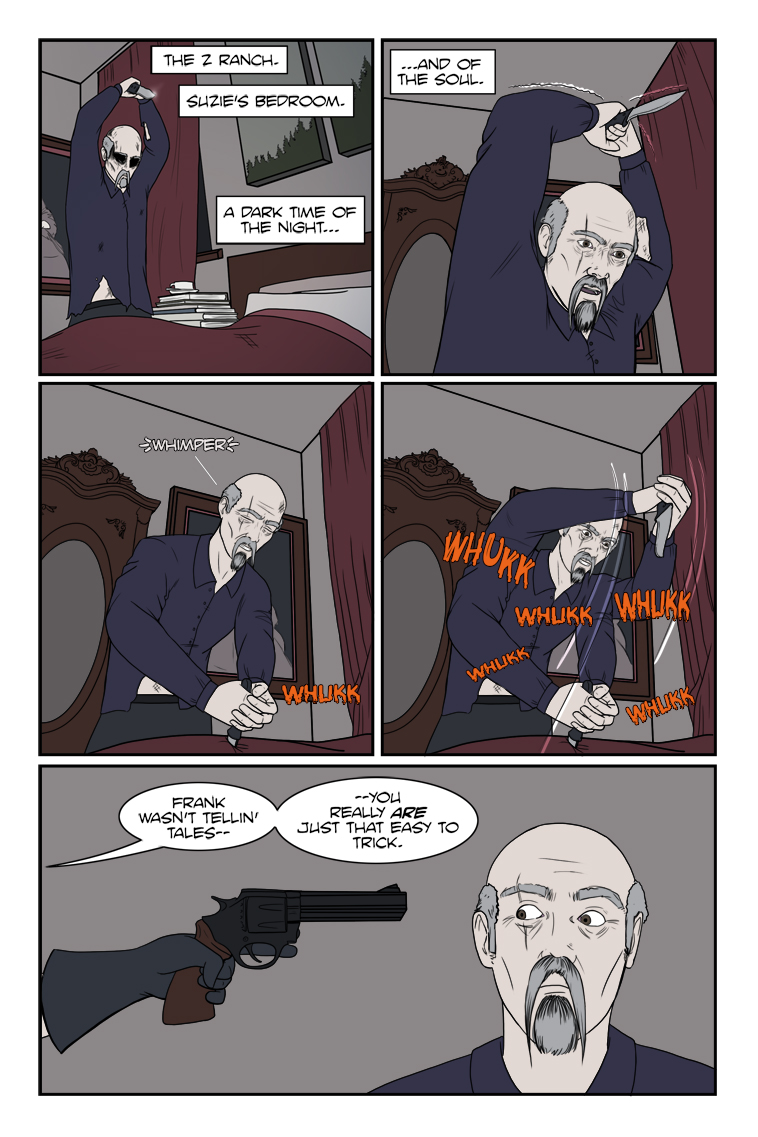

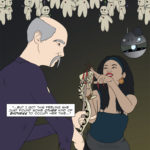
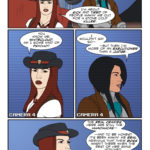
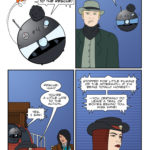
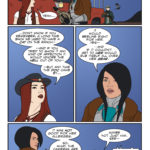
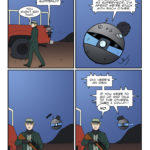
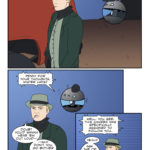
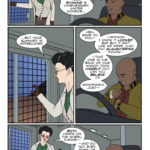
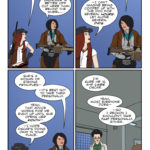
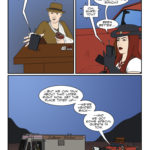
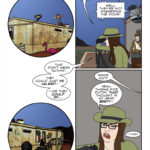
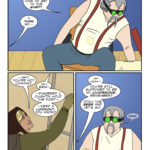
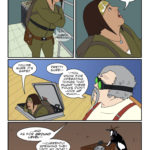
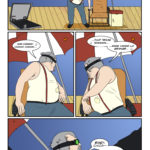
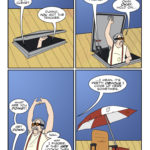
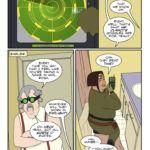
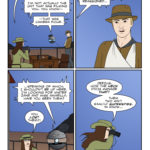
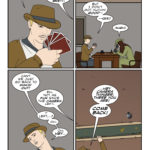
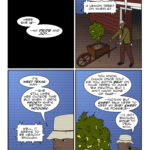
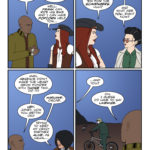
8 thoughts on “540 – Trick Hello”
Scarsdale
Called it, she figured he’d do this, if by choice or by zombie voodoo. I’m sure the “friendlier” questioning will start soon, if she doesn’t just kill him out-right. Or just add him to the herd.
Crazyman
Gotcha!
Zombatar
This turn of events is a surprise only to Eustace. And, maybe, Eustace’s subconscious. After all, this way he doesn’t have to actually risk actually attacking Suzie, which gives him a greater chance of survival than actually attacking her. I wonder what he was promised/threatened with?
ConcordBob
Not to nit-pick, but since sights are on target, finger should be on the trigger. Especially this close.
The usual rule is “keep finger straight and off trigger until sights are on target”.
Dr. Norman (not a real doctor)
Not to nit-pick, but since that was current philosophies regarding trigger discipline have evolved.
Of course, it will depend on who you get/got your training from.
Experiments have determined that the fraction of a second to go from finger off the trigger to finger firing when appropriate is insignificant, and the risk of firing unintended is greatly reduced.
Dr. Norman (not a real doctor)
I did the google thing and I believe I saw how you reached this conclusion … but there are two parts to it – One should not omit the second part.
“Trigger Finger Discipline: · The practice of keeping your finger “off the trigger” until your sights are on target AND YOU ARE READY TO DISCHARGE THE FIREARM.” (Caps are my own)
Crazyman
She wants him alive so she can question him; otherwise, he’d already be dead.
ConcordBob
Good discussion on trigger discipline!
His skin is very pale / gray. Is this malnourishment, or has he been poisoned with a mind-control drug? I would have to go back and look a t all various of skin tone.